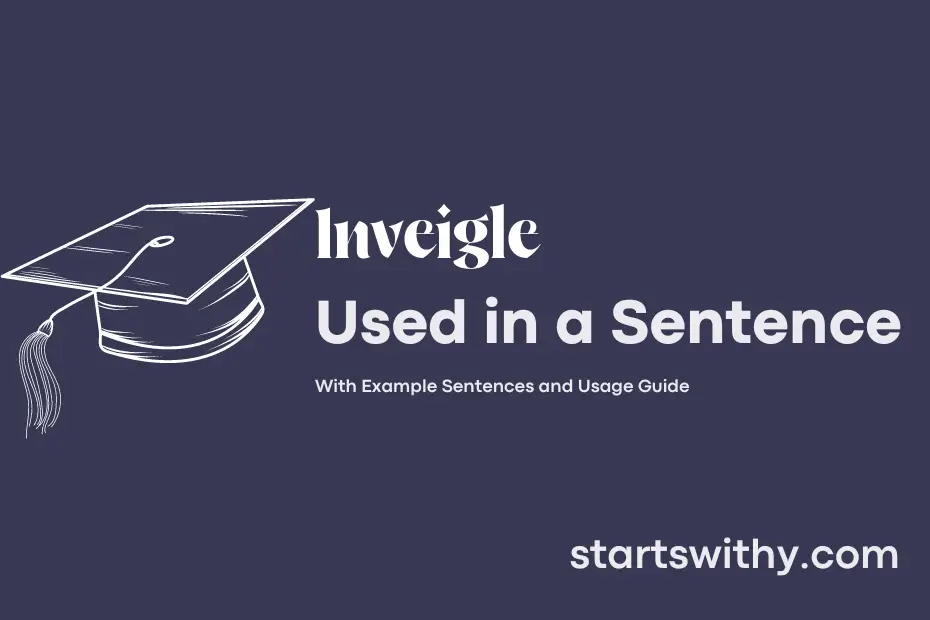Have you ever found yourself swayed or persuaded by someone in a subtle or deceptive manner? This is precisely what the term “inveigle” encapsulates – the act of enticing, coaxing, or manipulating someone into doing something through cunning or deceit.
Inveigle operates as a potent word to describe the subtle art of persuasion that can sometimes border on manipulation. It suggests a clever and crafty approach to influencing others that may not always be entirely above board.
7 Examples Of Inveigle Used In a Sentence For Kids
- The tricky fox tried to inveigle the crow into dropping the piece of cheese.
- The sly cat used its cuteness to inveigle the fish out of the pond.
- The clever monkey tried to inveigle the other animals into sharing their bananas.
- The mischievous squirrel wanted to inveigle the birds into sharing their seeds.
- The playful puppy tried to inveigle its owner into giving it more treats.
- The crafty magpie attempted to inveigle the farmer into dropping some corn.
- The smart parrot used its colorful feathers to inveigle the children into sharing their snacks.
14 Sentences with Inveigle Examples
- Inveigle your friends into joining your study group by highlighting the benefits of collaborative learning.
- You can inveigle your classmates to attend the workshop by emphasizing the valuable skills they will acquire.
- Try to inveigle your roommates into helping with the college event by emphasizing the fun and satisfaction of contributing to a successful event.
- Don’t let anyone inveigle you into procrastinating on your assignments; stay focused and prioritize your tasks.
- Inveigle your classmates to participate in the debate competition by highlighting the opportunity to enhance their public speaking skills.
- Avoid getting inveigled into buying expensive study materials; look for more affordable options or free resources online.
- You may feel tempted to inveigle your classmates into skipping class, but remember the importance of attending lectures for your academic progress.
- Make sure to inveigle your friends to join your sports team by emphasizing the benefits of staying active and healthy.
- While socializing is important, don’t let anyone inveigle you into attending late-night parties if it affects your early morning classes.
- Avoid getting inveigled into spending all your money on unnecessary items; create a budget and stick to it.
- It’s easy to inveigle your friends into binge-watching shows, but remember to balance your entertainment with your academic responsibilities.
- Inveigle your classmates into volunteering for campus clean-up drives by highlighting the positive impact on the environment and community.
- Be wary of individuals who try to inveigle you into cheating on exams; uphold your academic integrity and focus on your own efforts.
- Encourage your peers to inveigle others to join student clubs and organizations for a well-rounded college experience.
How To Use Inveigle in Sentences?
Inveigle means to persuade someone to do something by using deception or flattery. Here’s a helpful guide on how to use this word in a sentence:
- When trying to get your friend to lend you their car, you could say, “I managed to inveigle my friend into letting me borrow their car for the weekend.”
- In a more professional setting, you could use it like this: “The salesperson tried to inveigle the customer into buying a more expensive product by offering a fake discount.”
- In a personal context, you might say, “She was able to inveigle her way into getting an invitation to the exclusive party.”
Remember, when using the word inveigle, you are describing a situation where someone is being persuaded or manipulated in a cunning or deceptive manner. It is important to note that this word has a negative connotation and implies that the person doing the inveigling is not being honest or straightforward in their approach.
Practice using inveigle in various contexts to become more comfortable with incorporating it into your vocabulary.
Conclusion
In conclusion, the use of inveigle in sentences is evident in various contexts, showcasing its versatility in subtly persuading or leading others into actions or beliefs. Examples of sentences featuring inveigle include “She tried to inveigle him into agreeing with her plan,” where the word indicates a manipulative attempt to sway someone’s opinion. Another sentence like “The salesman tried to inveigle her into buying the expensive car,” highlights the deceptive nature of persuading someone into making a purchase. Overall, the word inveigle conveys a sense of cunning persuasion that can have both positive and negative connotations, depending on the context in which it is used.



